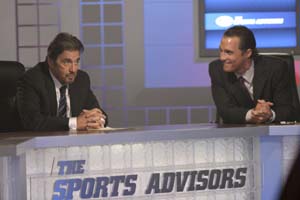TWO FOR THE MONEY
(director: D.J. Caruso; screenwriter: Dan Gilroy; cinematographer: Conrad W. Hall; editor: Glen Scantlebury; music: Christophe Beck; cast: Al Pacino (Walter Abrams), Matthew McConaughey (Brandon Lang), Rene Russo (Toni Abrams), Armand Assante (Novian), Jeremy Piven (Jerry), Craig Veroni (Amir, better); Runtime: 100; MPAA Rating: R; producers: Jay Cohen/James G. Robinson; Universal Pictures; 2005)
“Ends up as a push.”
Reviewed by Dennis Schwartz
D.J. Caruso’s (“Taking Lives”) downbeat primer for betters is as annoying to watch as one of those infomercials for sports betters. It once again has Al Pacino in the same type of mentor role he played in The Devil’s Advocate. The derivative film is one part “Boiler Room” another part “Jerry Maguire,” as it bets its wad on it getting over as a serious morality driven melodrama about the dangers of the sports betting craze sweeping across America. Turgidly scripted by Dan Gilroy, it ends up as a push (which is as good as kissing your sister, since no one wins). We’re told there’s $200 billion a year bet illegally on sports, and many people have destroyed their lives because of their gambling addiction. Caruso weighs in on the subject with this hysterical presentation of the up and down sides of being a hustler, while giving Pacino enough room to go into his long hammy philosophical monologues about what it all means. Actually it means nothing, which becomes a problem for the pic.
Handsome stringy blond Matthew McConaughey stars as Brandon Lang, a former star college quarterback in Division 1A whose goals changed when he suffered a career ending knee injury. While earning ten dollars an hour making picks in Las Vegas for a 1-900 number, the telemarketer is recruited by big-time sports betting consultant from the Big Apple Walter Abrams (Al Pacino) and begins work picking college football games. Walter fixes the kid up with a sports junkie’s dream crib in his brownstone on Old Fulton Street, in Brooklyn. Soon Brandon picks the pro games and becomes the No. 1 handicapper in the betting consultant’s cable-TV business (legal because they don’t take bets, only offer tips and get a percentage of their client’s winnings) and is Walter’s protégé. We meet Walter’s nice-girl manicurist wife, an ex-junkie, of the last 12 years and his daughter, and learn that neither Walter (a recovering gambling addict who hasn’t gambled for many years) or Brandon gambles; they just encourage their clients through a hard-sell in their phone talks to trust their picks and throw them a percentage of their winnings. It’s all a hustle, smoke and mirrors, and as a year passes all is well and good as Brandon, whose name was changed to John Anthony to give him a more important image, has a phenomenal eighty-percent winning average and his surrogate sugar daddy sets him up with the spoils of war. But when things turn sour, we get a second half of the film that delivers an unconvincing lesson that illegal betting is not good for the heart or soul as the trio has to deal with adversity.
It clearly tries to cash in on the growing popularity for sports and gambling, but seems unsure of what it wants to say. Pacino is not Mephistopheles but is made into a complicated figure, who can ruthlessly use his clients to gain wealth but can also be loving to his family and paternal to his best handicapper. What all this means is not much, which is why the long-winded pic never had much of an offense as it stagnates into a confusing morality fable about characters who do not deserve our sympathy or for that matter our time.

REVIEWED ON 10/12/2005 GRADE: C-